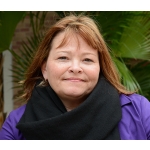Christy Tyson is a Educational Media and Technologies Section (EMTS) 2019 Annual Meeting Grant recipient, which enabled her to attend MLA ’19 in Chicago. Read about the experience of Kelsa Bartley, the other EMTS 2019 Annual Meeting Grant recipient.
My favorite and most impactful event that I attended during MLA ’19 was the Janet Doe Lecture given by Gerald (Jerry) Perry, AHIP, FMLA, University of Arizona Libraries and University of Arizona Health Sciences Library, University of Arizona–Tucson. Because I am a relatively new member of MLA, just two and half years, I was not familiar with Janet Doe or Jerry Perry. I felt as though I was on a journey through time as I listened to Perry’s speech. His experiences paralleled mine as I progressed through undergraduate school, clinical practice as a dental hygienist, and then my extended progression into the world of medical librarianship. While I am not gay, I have been both a clinician and health sciences student who treated lesbian, gay, bisexual, transgender, queer (LGBTQ+) patients. I have many friends who have been directly impacted by HIV/AIDS and a gay nephew who came out at the early age of twelve. I clearly remember the public response and controversies regarding HIV throughout the 1980s and early 1990s. What I did not know is that MLA needed guidance and push-back from members to finally recognize the need for bipartisan librarianship to actively disseminate and post accurate information regarding the virus.
After becoming a librarian, I experienced firsthand similar bias to what Perry described professionally. I was very fortunate to travel, in my role as a librarian, to several African nations. I was told by administration and government officials not to discuss, disseminate, or help citizens research family planning, HIV/AIDS, and other topics during my stay in their countries. The reality was that I was concurrently inundated with requests by those very citizens for this very important information. I was a conscientious opposer to the administrative and government requests and helped the patrons access good information about their queries instead. Yes, I could have been thrown out or even imprisoned for this action, but the need outweighed the consequences.
One of the reasons I am so passionate about being a librarian is that I get to provide open access to as many patrons as I can, on any subject they require. I have made it a personal mission to maintain an open mind regarding all requests. I never want my opinion on any matter to be reflected in my work as a librarian, be that in a positive or negative way.
After attending and then contemplating Perry’s lecture, my take-away was that the United States and the library community have come a long way but still have far to go in consistent service for LGBTQ+ patrons. I can, however, strive to provide unbiased, uncensored, and consistent service to my community. I am proud to share that I have already put action behind this newfound drive. I determined that there is an obligation for me, as the regional medical librarian in charge of library services, to raise awareness of the range of LGBTQ+ related medical evidence that providers and associates in my organization have access to and to welcome suggestions for more. Therefore, I created a LibGuide that provides direct links to paid and open access LGBTQ+ health information. This guide is outward facing on the library website; however, access to the resources by users outside of the organization will be blocked due to licensing.
My partner librarian and I have been educating new providers and residents about this guide during recent orientations. It has been very well received! Comments include: “I had no idea we had access to this information!” and “Thank you for this, I will use it.”
Had I not been able to attend MLA ’19 and hear the Janet Doe Lecture, I do not think I would have been tuned in to actively include LGBTQ+ health resources on a LibGuide. I am appreciative of the EMTS travel grant that allowed me to learn and grow professionally and that, in turn, provided me with the renewed confidence to provide needed information to my community.



